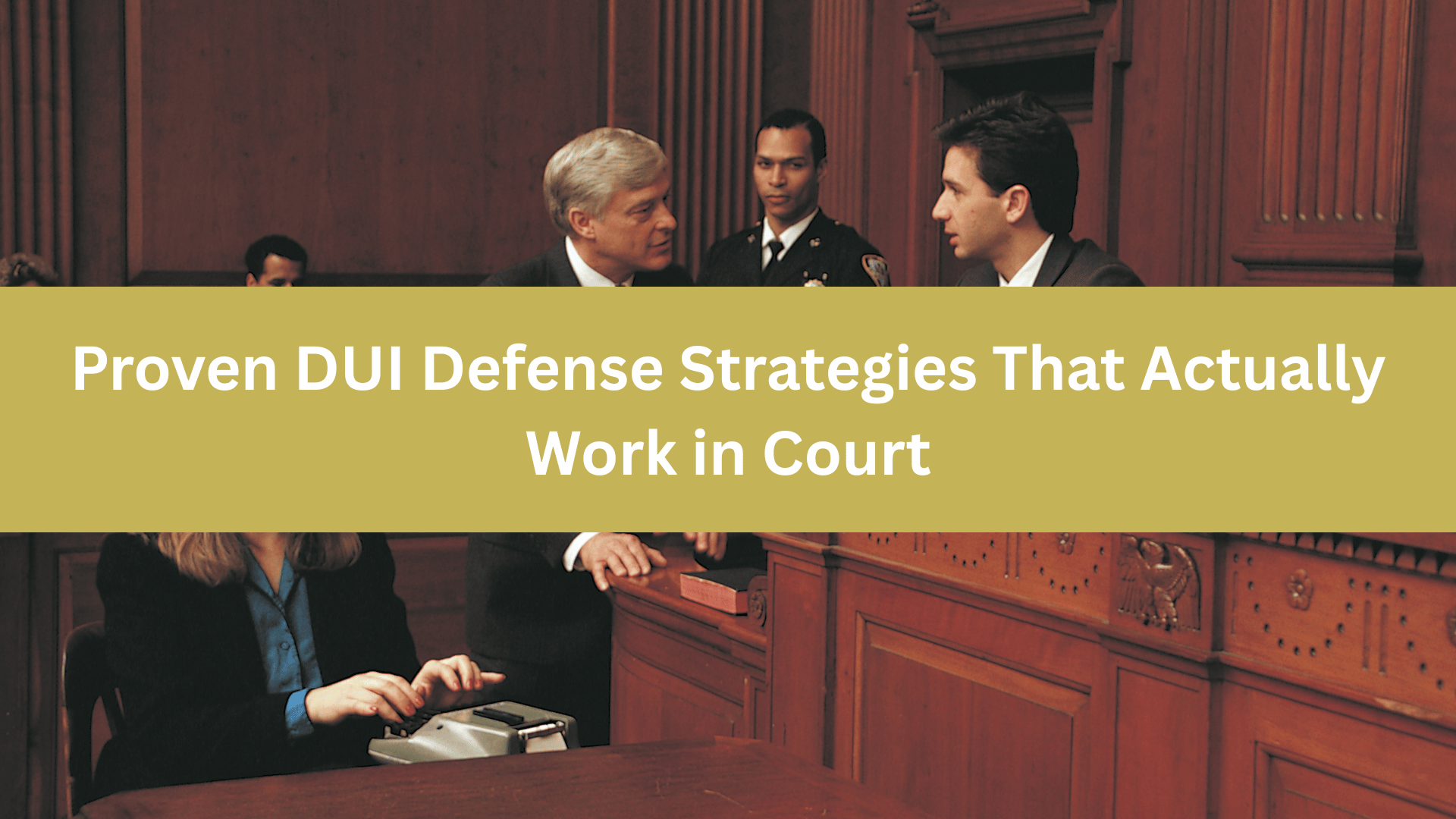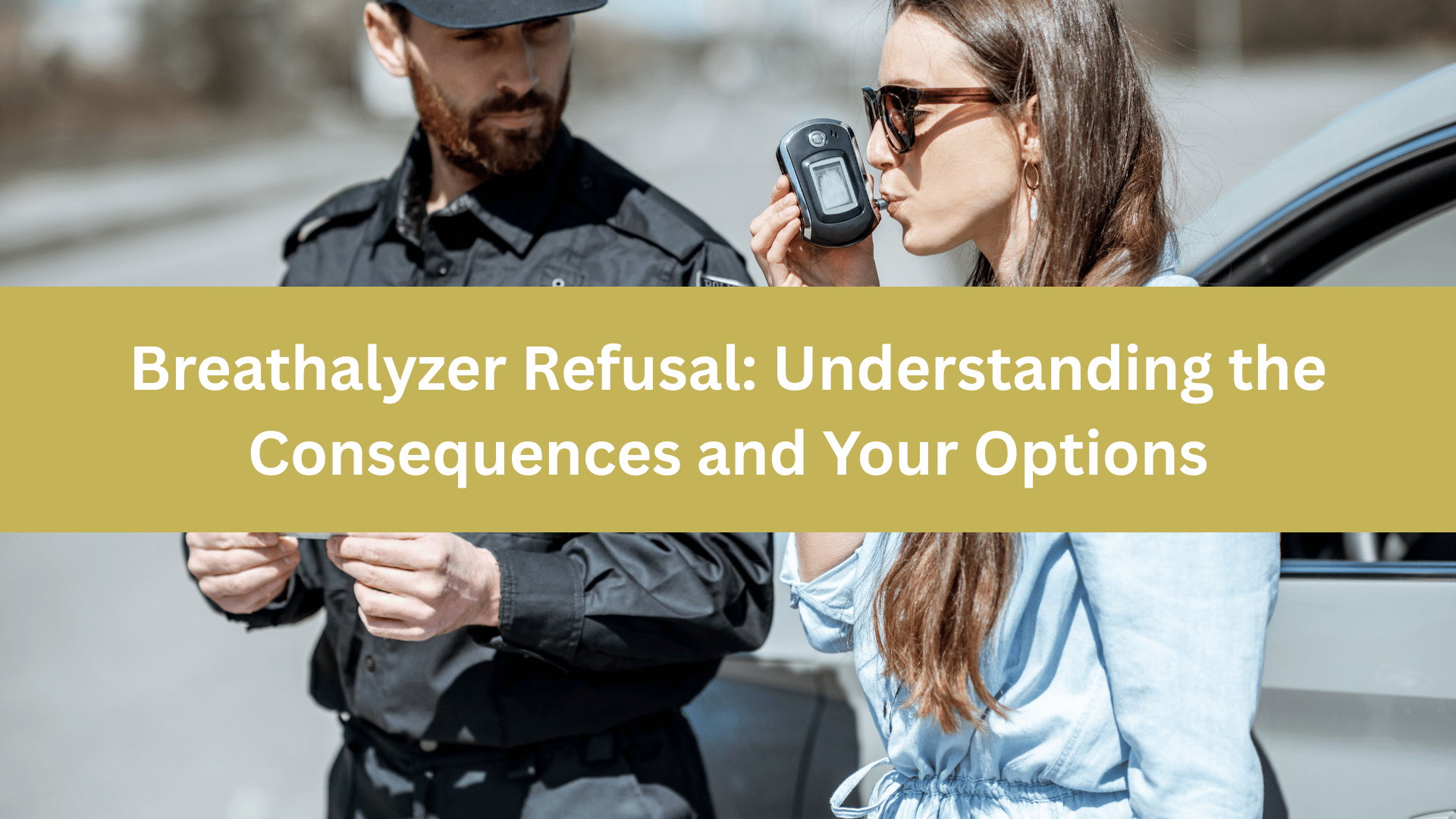Proven DUI Defense Strategies That Actually Work in Court
Learn about effective DUI defense strategies from former prosecutors. Discover how challenging evidence, procedural errors, and constitutional violations can lead to case dismissals or reduced charges.

Proven DUI Defense Strategies That Actually Work in Court
As former prosecutors who now defend DUI cases, we have a unique perspective on what defense strategies actually work in court. We've seen cases from both sides of the courtroom, and this experience gives us invaluable insight into building winning defenses for our clients.
The Former Prosecutor Advantage
Understanding the Prosecution's Playbook
Having prosecuted hundreds of DUI cases, we know:
- How prosecutors evaluate case strength
- What evidence they rely on most heavily
- Common weaknesses in the state's case
- Which arguments resonate with judges and juries
This insider knowledge allows us to anticipate prosecution strategies and build more effective defenses.
Key Areas We Target for Defense
Based on our prosecutorial experience, we focus on these critical areas:
- Constitutional violations
- Procedural errors
- Scientific evidence challenges
- Witness credibility issues
- Alternative explanations for observations
Strategy 1: Challenging the Initial Stop
The Foundation of Every DUI Case
Every DUI case begins with a traffic stop, and if that stop was illegal, everything that follows can be suppressed.
Common Challenges:
- Lack of reasonable suspicion for the initial stop
- Pretextual stops where the real reason was a hunch about DUI
- Anonymous tips without sufficient corroboration
- Checkpoint violations that don't meet legal requirements
Real-World Example
Case Study: People v. Client X
- Situation: Client stopped for "weaving" at 2 AM
- Challenge: Officer's dash cam showed normal driving
- Result: Motion to suppress granted, case dismissed
The prosecution must prove the officer had reasonable suspicion for the stop. If they can't, all evidence obtained afterward is inadmissible.
Strategy 2: Attacking Field Sobriety Test Administration
The Science Behind FSTs
Field Sobriety Tests are not as reliable as prosecutors claim. We challenge:
Standardization Issues:
- Tests not administered according to NHTSA protocols
- Environmental factors affecting performance
- Physical conditions unrelated to alcohol
- Officer training and certification problems
Common FST Challenges:
-
Horizontal Gaze Nystagmus (HGN)
- Officer lacks proper training
- Medical conditions causing nystagmus
- Improper administration technique
-
Walk-and-Turn Test
- Unsuitable testing surface
- Inadequate instructions
- Physical limitations of defendant
-
One-Leg Stand Test
- Age, weight, or injury factors
- Poor lighting conditions
- Inappropriate footwear
Successful Defense Approach
We systematically examine:
- Officer's training records
- Video evidence of test administration
- Client's medical history
- Environmental conditions during testing
Strategy 3: Challenging Breathalyzer Results
Understanding Breathalyzer Limitations
Breathalyzer machines are not infallible. Common challenges include:
Machine Calibration Issues:
- Improper maintenance records
- Calibration outside acceptable ranges
- Use of incorrect calibration solutions
Operator Error:
- Insufficient observation period
- Improper breath sample collection
- Failure to follow protocols
Physiological Factors:
- Mouth alcohol contamination
- Medical conditions affecting results
- Diet and medication interactions
Technical Defenses That Work
Rising Blood Alcohol:
- Alcohol still absorbing at time of driving
- BAC higher at testing than while driving
- Timeline analysis proving innocence at time of driving
Partition Ratio Challenges:
- Individual variations in breath-to-blood ratios
- Temperature and health factors
- Machine assumptions vs. individual physiology
Breathalyzer results can be challenged on multiple scientific and procedural grounds. Each case requires individual analysis of the specific circumstances and testing procedures.
Strategy 4: Blood Test Challenges
Chain of Custody Issues
Blood evidence must maintain a proper chain of custody:
- Collection procedures must follow protocols
- Storage and transportation must prevent contamination
- Laboratory analysis must meet standards
- Documentation must be complete and accurate
Scientific Challenges
Fermentation and Contamination:
- Improper storage leading to alcohol production
- Bacterial contamination affecting results
- Preservative and anticoagulant issues
Laboratory Errors:
- Analyst qualifications and training
- Equipment calibration and maintenance
- Quality control procedures
- Cross-contamination between samples
Strategy 5: Medical and Alternative Explanations
Medical Conditions Mimicking Intoxication
Many medical conditions can cause symptoms that officers interpret as intoxication:
Neurological Conditions:
- Inner ear problems affecting balance
- Diabetic episodes
- Seizure disorders
- Brain injuries
Physical Conditions:
- Fatigue and sleep deprivation
- Allergies and sinus problems
- Prescription medication effects
- Eye conditions affecting nystagmus
Building Medical Defenses
We work with medical experts to:
- Review client's medical history
- Obtain relevant medical records
- Consult with specialists when needed
- Present alternative explanations to juries
Strategy 6: Witness Credibility Challenges
Questioning Officer Testimony
Officers are human and make mistakes. We examine:
Training and Experience:
- Adequacy of DUI detection training
- Recent certification status
- Previous testimony in other cases
- Disciplinary history
Observation Conditions:
- Lighting and weather conditions
- Officer's position and vantage point
- Distractions during the stop
- Time spent observing the defendant
Civilian Witness Issues
When civilian witnesses are involved:
- Bias and motivation for testimony
- Opportunity to observe clearly
- Consistency in statements
- Reliability of identification
Strategy 7: Procedural and Constitutional Violations
Miranda Rights Violations
While not always required in DUI cases, Miranda violations can occur:
- Custodial interrogation without warnings
- Continued questioning after invocation of rights
- Coercive interrogation techniques
Fourth Amendment Violations
Unreasonable Search and Seizure:
- Searches without consent or warrant
- Prolonged detention without justification
- Inventory searches exceeding scope
Due Process Violations
- Denial of right to counsel
- Failure to provide required warnings
- Destruction of potentially exonerating evidence
Strategy 8: Negotiation and Plea Bargaining
Leveraging Weaknesses for Better Deals
Our prosecutorial experience helps us:
Identify Case Weaknesses:
- Evidence problems prosecutors recognize
- Witness reliability issues
- Constitutional concerns
Negotiate Effectively:
- Understanding prosecutor priorities
- Knowing what deals are possible
- Timing negotiations strategically
Alternative Resolutions
Wet Reckless Plea:
- Reduced charge with lesser penalties
- Shorter probation period
- Lower fines and fees
Dry Reckless Plea:
- No alcohol-related conviction
- Minimal impact on driving record
- Significantly reduced consequences
Strategy 9: Trial Preparation and Jury Selection
Preparing for Trial
When cases go to trial, preparation is everything:
Evidence Presentation:
- Visual aids and demonstrative evidence
- Expert witness testimony
- Timeline reconstruction
- Alternative theory presentation
Jury Selection Strategy:
- Identifying favorable juror profiles
- Addressing bias during voir dire
- Building rapport and credibility
Trial Tactics That Work
Opening Statement Strategy:
- Setting reasonable doubt themes early
- Highlighting prosecution weaknesses
- Establishing client credibility
Cross-Examination Techniques:
- Exposing officer training gaps
- Highlighting procedural errors
- Creating reasonable doubt through questioning
Combining Strategies for Maximum Effect
Multi-Layered Defense Approach
The most effective DUI defenses combine multiple strategies:
- Challenge the stop (constitutional issues)
- Attack the evidence (scientific challenges)
- Present alternatives (medical explanations)
- Expose weaknesses (procedural errors)
- Negotiate strategically (plea bargaining)
Case-Specific Strategy Development
Each case requires a tailored approach based on:
- Specific facts and circumstances
- Available evidence and witnesses
- Client's background and needs
- Prosecution's case strength
- Local court practices
The Importance of Early Intervention
Why Timing Matters
The earlier we get involved, the more options we have:
Immediate Actions:
- Preserve evidence before it's lost
- Interview witnesses while memories are fresh
- Request DMV hearing within 10-day deadline
- Begin building defense strategy
Long-term Benefits:
- More time for investigation
- Better negotiation position
- Stronger trial preparation
- Improved client outcomes
Conclusion
Effective DUI defense requires more than just legal knowledge—it demands strategic thinking, scientific understanding, and courtroom experience. Our background as former prosecutors gives us unique insights into what works and what doesn't in DUI cases.
Every case is different, and the best defense strategy depends on the specific facts and circumstances involved. However, by systematically challenging the prosecution's evidence, exposing procedural errors, and presenting alternative explanations, we can often achieve favorable outcomes for our clients.
Remember, the prosecution has the burden of proving guilt beyond a reasonable doubt. Our job is to create that doubt through careful analysis, strategic challenges, and effective advocacy. With the right approach and experienced representation, even seemingly strong DUI cases can be successfully defended.
Don't face DUI charges without experienced legal representation. The strategies and techniques that work in court come from years of experience on both sides of the legal system. Contact us today to learn how our former prosecutor experience can benefit your defense.
Need Legal Help with Your San Jose DUI Case?
Our experienced San Jose DUI attorneys are here to help. Contact us for a free consultation.
